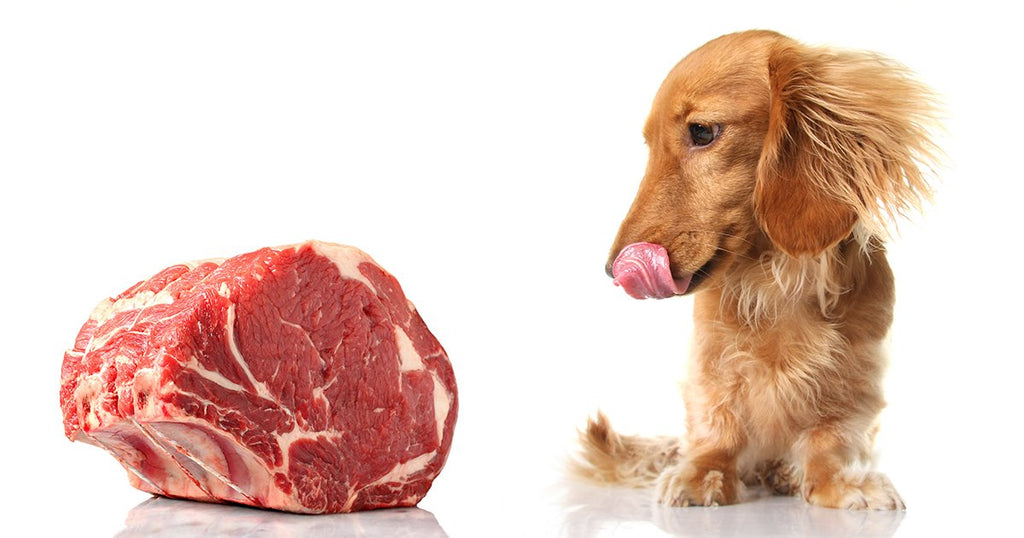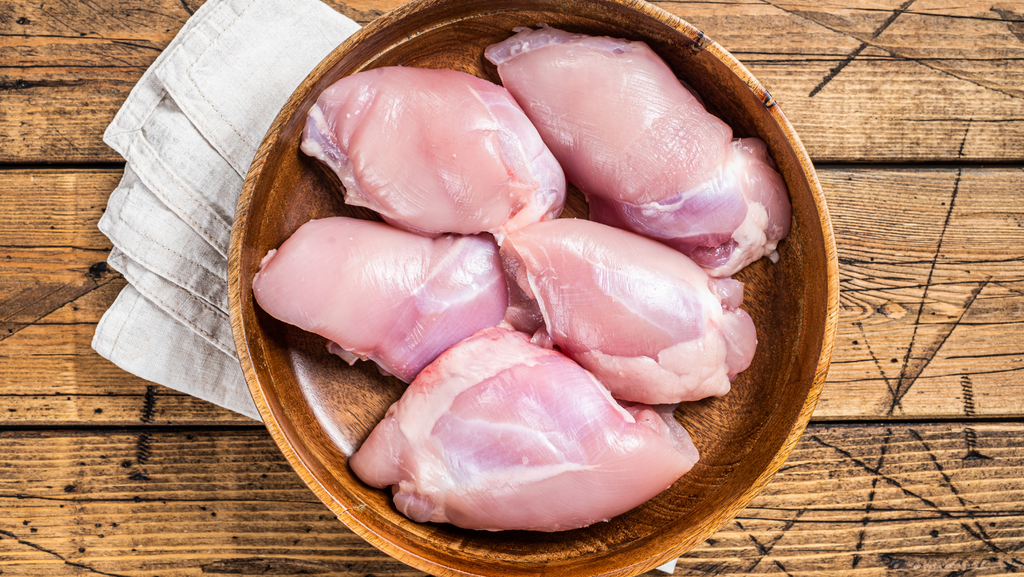Are Vets Against a Raw Diet For Dogs?
With BARF raw dog food diets becoming more and more popular for dogs, it’s no wonder owners want to know if raw foods are safe. With the allure of fresh fruits, vegetables, herbs, and fresh meat, many dog owners have switched to raw feeding. If you’re a concerned dog owner that wants the best for your dog, we commend you for doing your research. A closer look at a raw diet’s risks and benefits along with veterinary opinions and studies can shine a light on whether or not a raw diet is right for your dog.

Do Vets Recommend Raw Diet for Dogs?
The majority of veterinarians still do not actively recommend raw feeding for dogs. However, some vets do promote raw feeding as a more beneficial diet than most commercial kibble choices [1]. While these vets are outliers, there are some veterinarians that wholeheartedly believe that raw feeding is the best choice for domesticated dogs.
What Do Veterinarians That Approve of Raw Feeding Say?
“Raw diets are more natural”
An increased number of practising veterinarians, such as Tom Lonsdale, DVM, advocate for dogs eating a natural selection of foods [2]. This means they promote the philosophy that dogs should eat what would have been biologically available to them if they were wild. Because, if wild dogs would eat an item, it should be nutritionally beneficial (or at least safe) for them.
Most veterinary professionals who support raw feeding often compare “natural raw diet food for dogs” to what wolves eat. This isn’t because dogs and wolves are identical, but because dogs inherited many mannerisms from their wolf ancestors. Studies show that domesticated dogs have adapted to eating more starches [3]. Furthermore, dogs retain many physiological characteristics that would make an ancestral wild dog’s diet similar to that of a wolf’s.
So What Makes Dogs Physiologically Adapted to Eating Raw Foods?
- Dogs have enzymes in their stomachs made to break down raw meat
- Salmonella poisoning in dogs is extremely rare [4]
“Raw feeding is a way to avoid carcinogens found in many commercial dog foods”
Vets recommend raw food as a way to avoid dangerous additives and preservatives that can be carcinogenic [5]. This gives dog owners more control over the ingredients that go into their dog’s food. This control makes it less likely that a pet owner will unknowingly feed their dog something that could cause cancer.
“Raw diets have benefitted dogs for decades”
Other vets make the compelling argument that greyhounds, sled dogs, and show dogs have thrived on raw diets for decades (if not longer) [6]. In fact, they say that greyhounds and sled dogs have benefited from the clean energy packed into raw meat and other raw ingredients.
What Do Veterinarians Say That Oppose Raw Feeding?

Vets that do not promote raw feedings often do so because they argue the risks do not outweigh the benefits. They also say that there are not enough studies yet to demonstrate that the benefits of raw feedings are accurate.
“Dog owners do not know what makes a balanced diet for dogs”
So, what are the risks that veterinarians are worried about? The most common criticism vets use to warn against raw feeding is that dog owners are not qualified to make their dogs’ food nutritionally balanced [4]. And for the most part, it can be very difficult for dog owners to perfectly formulate a dog’s diet, but it is possible with guidance from a veterinary nutritionist.
“Handling raw meat can get people sick.”
Veterinarians also discourage homemade raw dog food because making raw dog food comes with another risk: cross-contamination [7]. This is when something that touches raw meat does not get properly sterilized, then spreads bacteria to another item or surface. This increases the risk of a person consuming the bacteria and becoming ill.
The most concerning bacteria include:
- Salmonella
- E. coli
- Listeria monocytogenes
- Clostridium perfringens
- Campylobacter
“BARF diets can result in tooth fractures from biting into bones”
Most raw diets, including biologically appropriate raw food (BARF) diets, do contain small ground bones, which are actually beneficial for dental health. However, homemade diets or poorly made raw dog foods can contain larger bone fragments that could result in dental damage. Selecting high-quality raw dog food can prevent dental damage caused by bones.
“Bones can create a choking hazard, digestive obstruction or tear”
Cooked bones can seriously injure a dog. They can cause broken teeth, splinters in the mouth or digestive tract, digestive obstruction, and constipation [8]. As for raw bones, though, they can be highly beneficial for dogs. They can provide a dog with much-needed minerals, enzymes, and stress relief.
Should You Feed Your Dog A Raw Diet?
With veterinarians still unable to agree on if a raw diet is safe and beneficial, it can be difficult for dog owners to make an informed decision [9]. When deciding if a raw diet is right for your dog, you will want to consider your dog’s needs and what you feel is most important regarding your dog’s diet. Ultimately, you have to use your judgment and weigh the benefits against the risks. Here are some insights that can make your decision easier:
Two facts about raw dog food:
-
Creating nutritionally balanced raw dog food is not easy. An unbalanced diet can result in your dog developing a nutritional imbalance and becoming ill. It's critical to understand how much raw food to feed dog on a raw diet. When homemaking raw dog food recipes, use nutritional guidelines formulated by a veterinary nutritionist.
- Raw meat can contain dangerous bacteria. Be cautious when handling raw meat. Always clean any surface that comes in contact with the raw meat, thoroughly. This will reduce the risk of cross-contamination. Picking up and cleaning your dog’s bowl after they complete their meals will also reduce the risk of spreading bacteria.
Dogs That Aren’t the Best Canine Candidates for Homemade Raw Diets
Puppies, elderly dogs, and dogs with weakened immune systems are not the best candidates for homemade raw dog food.
This is because a puppy’s nutritional needs can vary greatly based on their breed, age, and size.
As for senior dogs and dogs with suppressed or compromised immune systems, they are at higher risk for becoming ill should they consume E. coli, Salmonella, or another bacteria.
Why You May Want to Choose a Raw Diet for Your Dog

The evidence that supports the benefits of a raw diet remains anecdotal but convincing. Many vets and dog owners agree that a carefully formulated raw diet is a healthier choice for dogs than mass-produced commercial dog foods.
While raw food used to be expensive and difficult to find, Petzyo has made it easy to order high-quality raw food. Raw dog foods made by reputable businesses are also safer than homemade dog food since commercial kitchens have safeguards that prevent food-borne bacteria.
Finally, raw diets allow you to feed your dog fresh foods which retain their full nutritional value. The transparency and limited fresh ingredients offer added value for dogs with dietary restrictions. With a raw diet, you can eliminate ingredients your dog’s body doesn’t process well.
The Best Way to Feed Raw
The easiest way to eliminate the risks of contamination and a nutritional deficiency in your dog’s raw food is to order your dog’s food from a company that cares.
First, when someone else cooks your dog’s food, you don’t have to worry about E. coli or other bacteria making their way across your kitchen.
Furthermore, selecting a reputable business that uses a veterinary nutritionist will ensure your dog’s food has everything they need to thrive. And no fillers or harmful chemicals. A trustworthy dog food company will also ensure your dog’s food was cooked and handled safely.
Is a raw diet recommended for dogs?
The jury remains out on whether or not a raw diet is the best choice for all dogs. However, it’s easy to avoid the risks that come along with raw feeding when you order your dog’s dinner from a company you can trust.
Are you ready for your dog to go raw? Learn more about why Petzyo’s Raw Royalty is the best raw dog food in Australia.
[2] Diet guide for domestic dogs and cats
[3] The genomic signature of dog domestication reveals adaptation to a starch-rich diet
[4] Get the Facts about Salmonella
[5] Evaluation of raw food diets for dogs




